The Intel Core i9-9900KS Review: The 5 GHz Consumer Special
by Dr. Ian Cutress on October 31, 2019 10:45 AM ESTCPU Performance: Rendering Tests
Rendering is often a key target for processor workloads, lending itself to a professional environment. It comes in different formats as well, from 3D rendering through rasterization, such as games, or by ray tracing, and invokes the ability of the software to manage meshes, textures, collisions, aliasing, physics (in animations), and discarding unnecessary work. Most renderers offer CPU code paths, while a few use GPUs and select environments use FPGAs or dedicated ASICs. For big studios however, CPUs are still the hardware of choice.
All of our benchmark results can also be found in our benchmark engine, Bench.
Corona 1.3: Performance Render
An advanced performance based renderer for software such as 3ds Max and Cinema 4D, the Corona benchmark renders a generated scene as a standard under its 1.3 software version. Normally the GUI implementation of the benchmark shows the scene being built, and allows the user to upload the result as a ‘time to complete’.
We got in contact with the developer who gave us a command line version of the benchmark that does a direct output of results. Rather than reporting time, we report the average number of rays per second across six runs, as the performance scaling of a result per unit time is typically visually easier to understand.
The Corona benchmark website can be found at https://corona-renderer.com/benchmark
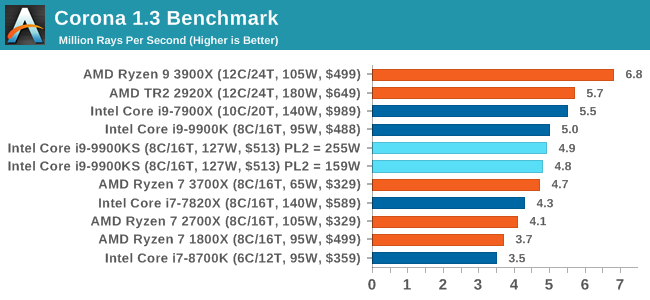
Interestingly both 9900KS settings performed slightly worse than the 9900K here, which you wouldn't expect given the all-core turbo being higher. It would appear that there is something else the bottleneck in this test.
Blender 2.79b: 3D Creation Suite
A high profile rendering tool, Blender is open-source allowing for massive amounts of configurability, and is used by a number of high-profile animation studios worldwide. The organization recently released a Blender benchmark package, a couple of weeks after we had narrowed our Blender test for our new suite, however their test can take over an hour. For our results, we run one of the sub-tests in that suite through the command line - a standard ‘bmw27’ scene in CPU only mode, and measure the time to complete the render.
Blender can be downloaded at https://www.blender.org/download/
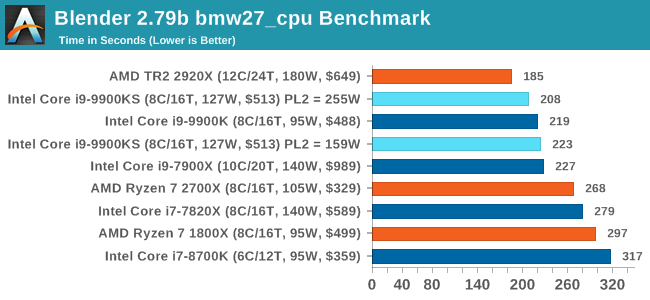
All the 9900 parts and settings perform roughly the same with one another, however the PL2 255W setting on the 9900KS does allow it to get a small ~5% advantage over the standard 9900K.
LuxMark v3.1: LuxRender via Different Code Paths
As stated at the top, there are many different ways to process rendering data: CPU, GPU, Accelerator, and others. On top of that, there are many frameworks and APIs in which to program, depending on how the software will be used. LuxMark, a benchmark developed using the LuxRender engine, offers several different scenes and APIs.
In our test, we run the simple ‘Ball’ scene on both the C++ and OpenCL code paths, but in CPU mode. This scene starts with a rough render and slowly improves the quality over two minutes, giving a final result in what is essentially an average ‘kilorays per second’.
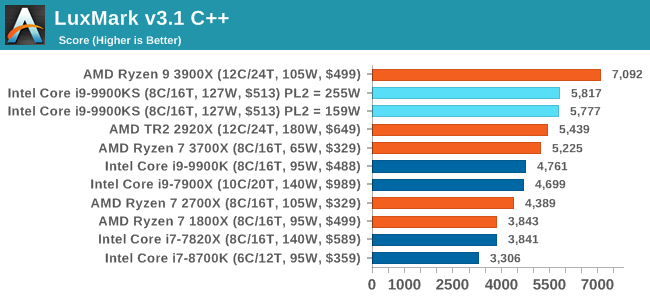
Both 9900KS settings perform equally well here, and a sizeable jump over the standard 9900K.
POV-Ray 3.7.1: Ray Tracing
The Persistence of Vision ray tracing engine is another well-known benchmarking tool, which was in a state of relative hibernation until AMD released its Zen processors, to which suddenly both Intel and AMD were submitting code to the main branch of the open source project. For our test, we use the built-in benchmark for all-cores, called from the command line.
POV-Ray can be downloaded from http://www.povray.org/
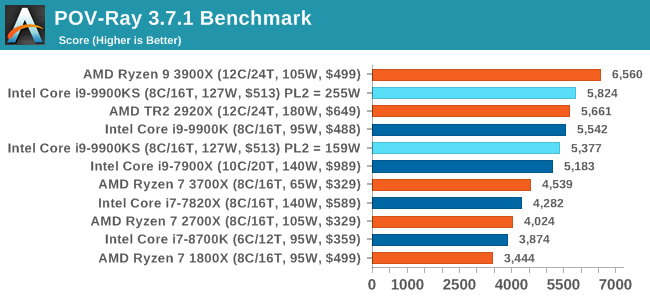
One of the biggest differences between the two power settings is in POV-Ray, with a marked frequency difference. In fact, the 159W setting on the 9900KS puts it below our standard settings for the 9900K, which likely had an big default turbo budget on the board it was on at the time.


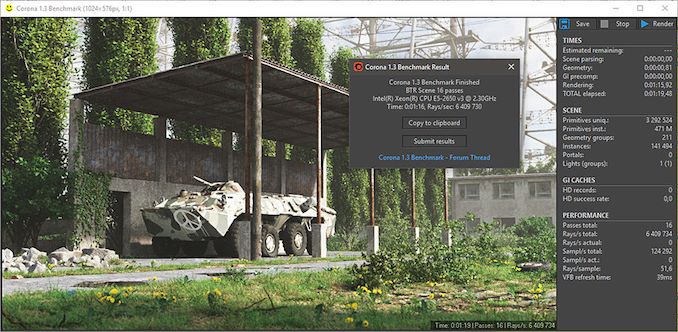








235 Comments
View All Comments
Spunjji - Friday, November 1, 2019 - link
172W for 8 cores at 5Ghz with the 9900KS142W for 12 cores at ~4.2Ghz for the 3900X.
The X570 chipset TDP is around 15W, 6W for Z390. There's simply no aspect of power efficiency where Intel come out on top here.
Sivar - Friday, November 1, 2019 - link
Please read the first couple of sentences before criticizing.No one is saying the 9900KS is a power efficiency winner. Indeed, when running compute-intense tasks, AMD's larger CPUs are likely the winner most of the time, but you cannot post one set of measurements with one specific configuration and draw broad conclusions. Other measurements differ, and most pit the idle power draw (where most PCs remain most of the time) as lower for Intel. For example,
https://www.guru3d.com/articles-pages/amd-ryzen-7-...
Korguz - Friday, November 1, 2019 - link
thats funny.. cause before zen.. thats what people were saying about amd.. and the power those chips use. now its the opposite, and its ok for intel to use so much power ??? come onvMax65 - Friday, November 1, 2019 - link
Just to add to this...der8aur just tested the 9900KS and it runs games all core 5GHz all the time at between 98w and 126w....Video showing this starts at 3:50..the only time it uses more power is if you are doing high compute loads and or with AVX workloads...but for gaming, it will stay well below...https://www.youtube.com/watch?v=YWSn0cHauJ4
Korguz - Friday, November 1, 2019 - link
well, this review, says other wise. maybe different test setups ??Jorgp2 - Thursday, October 31, 2019 - link
That's because AMDs CPUs were woefully underpowered.Intel is still more efficient in the mobile space
evernessince - Friday, November 1, 2019 - link
Humans find ways to defend their purchases. RTX 2080 Ti owners have 1,200 reasons to defend theirs.AshlayW - Friday, November 1, 2019 - link
If I only I could upvote this post...vMax65 - Friday, November 1, 2019 - link
Surprising that it seems to hurt some that others might want to buy a RTX 2080Ti or a 9900K or a Ferrari for whatever reason. Are we now all to be lambasted for buying anything that maybe costs more?...or heaven forbid they want the best!!! Oh no...run!!! You might as well start on all those that buy better shoes, cookers, microwaves, TV's, bread, cars, chocolates, phones etc, etc ad infinitum or for that matter any branded products period as they cost more than there non branded counter parts...Hold on, we are not going far enough, here's an idea, lets all wear the same clothes, live in the same houses, watch the same TV, eat the same gruel, have only one manufacturere of all products.......so no one can be different and most importantly we certainly do not want any choice, creativity, design et all....Madness......
Midwayman - Thursday, October 31, 2019 - link
I'm mostly reading its a bad time to buy a 9900K since intel will have binned out all the golden samples.